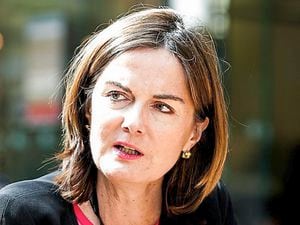Ludlow MP Dunne welcomes dropping of 'normal birth' campaign
A Shropshire MP and health minister has welcomed the scrapping of a campaign urging women to have babies without medical intervention.

The Royal College of Midwives (RCM) has dropped its ‘campaign for normal birth’ after the hard-line agenda was blamed for the deaths 11 babies and one mother at the University Hospitals of Morecambe Bay maternity unit in Cumbria.
Philip Dunne, minister for health and MP for Ludlow has now welcomed the move by the RCM, which indicated women will no longer be advised to have babies without medical intervention, and said tackling such "tragic failures" will be made a priority.
An inquiry into the scandal at Cumbria between 2004 and 2013 attributed it to a ‘dysfunctional culture’ spearheaded by a gang of ‘musketeer midwives’.
Now national figures have also shown the number of babies left brain-damaged by NHS blunders has soared to four a week, with claims against maternity units for botched births leaping by almost a quarter last year.
The figures were revealed in the 2016/17 annual report of NHS Resolution, which handles litigation action against the Health Service.
Parents made 232 claims against the NHS in 2016/17 – about 20 a month – the highest figure for 11 years.
The total value of compensation payouts for brain damage and cerebral palsy was the highest on record, up nearly a third to £1.9 billion according to the report, an average of more than £8 million per child.
Safety experts blamed a fixation with so-called natural births with minimal medical intervention for the errors and record negligence bills.
Peter Walsh, chief executive of Action against Medical Accidents campaigning group, said: "More research needs to be done, but moving away from the cult-like fixation with so-called 'normal birth' is a step in the right direction.
‘It is likely that this and also staffing issues has led to delays in intervention to protect babies and their mothers.
"No mother should be made to feel abnormal because an intervention is needed and patient safety should always be the first concern."
Patient safety specialist James Titcombe, whose baby Joshua died due to failings at Morecambe Bay NHS Trust in 2008, agreed, adding: "The idea of normal birth at any cost has had dangerous consequences.
"Part of this is the language makes women who don’t have a 'normal birth' feel like a failure, but it’s also about the fact it leaves too many women and babies at risk, at a point when midwives should be asking for help."
Mr Dunne welcomed the fact that the RCM had ended its campaign for normal births.
He said: "The NHS is already one of the safest places in the world to give birth. But we want NHS maternity care to be even better and have made tackling such tragic failures a priority."





